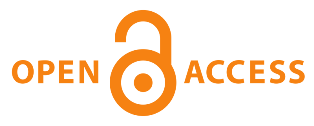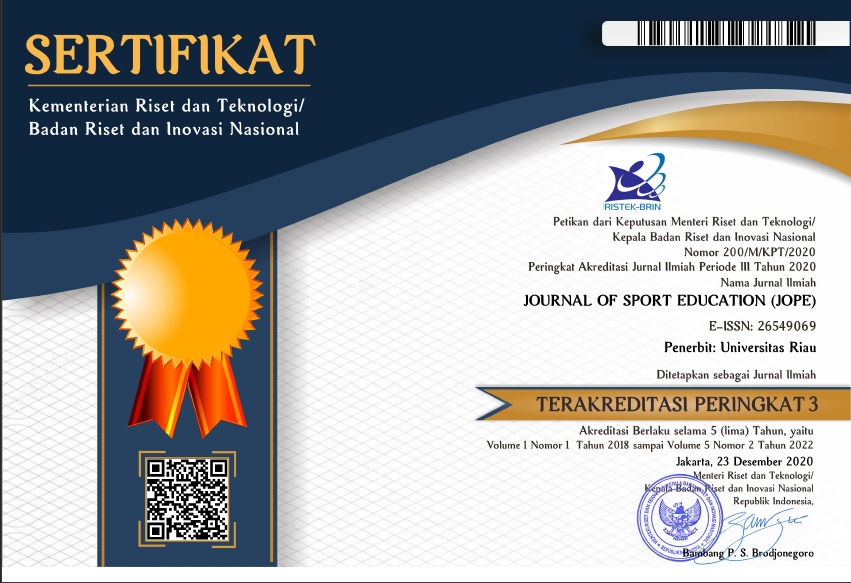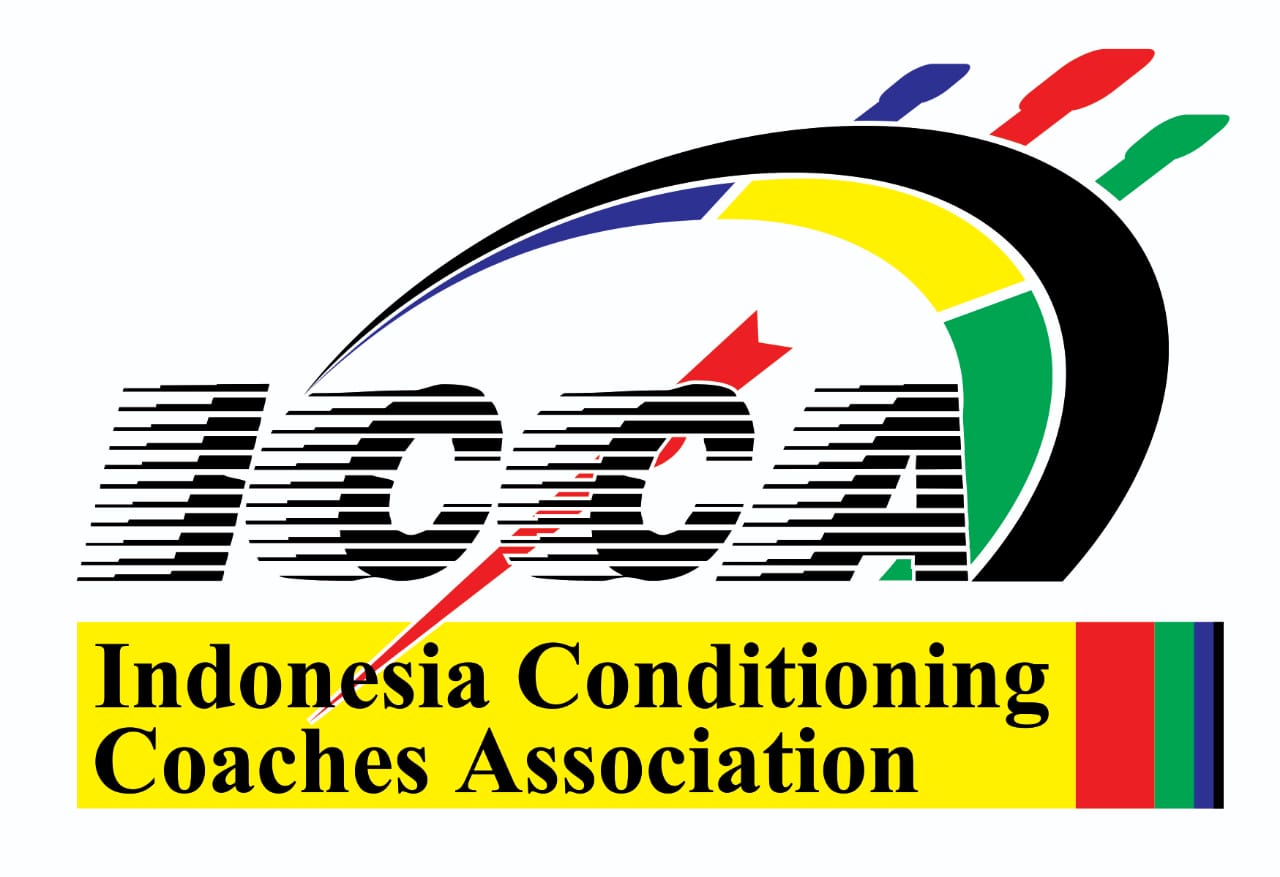Focus and Scope
Journal of Sport Education (JOPE) is under publishment of the Program Studi Pendidikan Jasmani Kesehatan dan Rekreasi, Universitas Riau, Indonesia. It publishes research on various aspects of the sports and exercise sciences, including anatomy, biomechanics, performance analysis, physiology, psychology, sports medicine, sports nutrition, health, and well-being, as well as coaching and talent identification and physical education. The Journal focuses on the human sciences including responses to technologies such as the design of sports equipment and training facilities, Sports Education, Sports Training, Sports Tourism, and Traditional Sports, athlete selection and recruitment, performance analysis or modification, and stress reduction. To be considered for publication, manuscripts must original and relevant to the aforementioned topics
Section Policies
Articles
Peer Review Process
Publication of articles in Journal of Sport Education (JOPE) is dependent solely on scientific validity and coherence as judged by our editors and/or peer reviewers, who will also assess whether the writing is comprehensible and whether the work represents a useful contribution to the field. Journal of Sport Education (JOPE) acknowledged the effort and suggestions made by its reviewers.
Initial evaluation of manuscripts
The Editor will first evaluate all manuscripts submitted at a maximum of 3 weeks time. Although rare, yet it is entirely feasible for an exceptional manuscript to be accepted at this stage. Those rejected at this stage are insufficiently original, have serious scientific flaws, or are outside the aims and scope of the Journal of Sport Education (JOPE). Those that meet the minimum criteria are passed on to expert reviewers for review. It usually took up to 8 weeks.
Type of peer review
Submitted manuscripts will generally be reviewed at least minimally by two experts who will be asked to evaluate whether the manuscript is scientifically sound and coherent, whether it duplicates the already published works, and whether or not the manuscript is sufficiently clear for publication. The method is blind peer review.
Review reports
Reviewers are asked to evaluate whether the manuscript:
Is original by stating the objectives and gap clearly
Is methodologically sound
Follows appropriate ethical guidelines
Has results/findings which are clearly presented and support the conclusions
Correctly references previous relevant work
Reviewers are not expected to correct or copyedit manuscripts. Language correction is not part of the peer-review process.
Decision
Reviewers advise the editor, who is responsible for the final decision to accept or reject the article. The Editors will reach a decision based on these reports and, where necessary, they will consult with members of the Editorial Board. Editor’s decision is final.
Open Access Policy
Journal of Sport Education (JOPE) provides immediate open access to its content on the principle that making research freely available to the public supports a greater global exchange of knowledge. Journal of Sport Education (JOPE) is an Open Access journal which means that all content is freely available without charge to the user or his/her institution. Users are allowed to read, download, copy, distribute,print, search, or link to the full texts of the articles, or use them for any other lawful purpose, without asking prior permission from the publisher or the author. This is in accordance with the BOAI definition of Open Access.

Publication Ethic
Publication Ethics and Malpractice Statement
Journal of Sport Eduation (JOPE) is a peer-reviewed electronic journal. This statement clarifies ethical behaviour of all parties involved in the act of publishing an article in this journal, including the author, the chief editor, the Editorial Board, the peer-reviewer and the publisher (Prodi Pendidikan Jasmani, Kesehatan dan Rekreasi Universitas Riau). This statement is based on COPE’s Best Practice Guidelines for Journal Editors.
Ethical Guideline for Journal Publication
The publication of a peer-reviewed article in Journal of Sport Eduation (JOPE) is an essential building block in the development of a coherent and respected network of knowledge. It is a direct reflection of the quality of the work of the authors and the institutions that support them. Peer-reviewed articles support and embody the scientific method. It is therefore important to agree upon standards of expected ethical behavior for all parties involved in the act of publishing: the author, the journal editor, the peer reviewer, the publisher and the society.
Prodi Pendidikan Jasmani, Kesehatan dan Rekreasi Universitas Riau as publisher of Journal of Sport Eduation (JOPE) takes its duties of guardianship over all stages of publishing extremely seriously and we recognize our ethical and other responsibilities. We are committed to ensuring that advertising, reprint or other commercial revenue has no impact or influence on editorial decisions. In addition, Prodi Pendidikan Jasmani, Kesehatan dan Rekreasi Universitas Riau and Editorial Board will assist in communications with other journals and/or publishers where this is useful and necessary.
Publication decisions
The editor of the Journal of Sport Eduation (JOPE) is responsible for deciding which of the articles submitted to the journal should be published. The validation of the work in question and its importance to researchers and readers must always drive such decisions. The editors may be guided by the policies of the journal's editorial board and constrained by such legal requirements as shall then be in force regarding libel, copyright infringement and plagiarism. The editors may confer with other editors or reviewers in making this decision.
Fair play
An editor at any time evaluates manuscripts for their intellectual content without regard to race, gender, sexual orientation, religious belief, ethnic origin, citizenship, or political philosophy of the authors.
Confidentiality
The editor and any editorial staff must not disclose any information about a submitted manuscript to anyone other than the corresponding author, reviewers, potential reviewers, other editorial advisers, and the publisher, as appropriate.
Disclosure and conflicts of interest
Unpublished materials disclosed in a submitted manuscript must not be used in an editor's own research without the express written consent of the author.
Duties of Reviewers
Contribution to Editorial Decisions
Peer review assists the editor in making editorial decisions and through the editorial communications with the author may also assist the author in improving the paper.
Promptness
Any selected referee who feels unqualified to review the research reported in a manuscript or knows that its prompt review will be impossible should notify the editor and excuse himself from the review process.
Confidentiality
Any manuscripts received for review must be treated as confidential documents. They must not be shown to or discussed with others except as authorized by the editor.
Standards of Objectivity
Reviews should be conducted objectively. Personal criticism of the author is inappropriate. Referees should express their views clearly with supporting arguments.
Acknowledgement of Sources
Reviewers should identify relevant published work that has not been cited by the authors. Any statement that an observation, derivation, or argument had been previously reported should be accompanied by the relevant citation. A reviewer should also call to the editor's attention any substantial similarity or overlap between the manuscript under consideration and any other published paper of which they have personal knowledge.
Disclosure and Conflict of Interest
Privileged information or ideas obtained through peer review must be kept confidential and not used for personal advantage. Reviewers should not consider manuscripts in which they have conflicts of interest resulting from competitive, collaborative, or other relationships or connections with any of the authors, companies, or institutions connected to the papers.
Duties of Authors
Reporting standards
Authors of reports of original research should present an accurate account of the work performed as well as an objective discussion of its significance. Underlying data should be represented accurately in the paper. A paper should contain sufficient detail and references to permit others to replicate the work. Fraudulent or knowingly inaccurate statements constitute unethical behaviour and are unacceptable.
Data Access and Retention
Authors are asked to provide the raw data in connection with a paper for editorial review, and should be prepared to provide public access to such data (consistent with the ALPSP-STM Statement on Data and Databases), if practicable, and should in any event be prepared to retain such data for a reasonable time after publication.
Originality and Plagiarism
The authors should ensure that they have written entirely original works, and if the authors have used the work and/or words of others that this has been appropriately cited or quoted.
Multiple, Redundant or Concurrent Publication
An author should not in general publish manuscripts describing essentially the same research in more than one journal or primary publication. Submitting the same manuscript to more than one journal concurrently constitutes unethical publishing behaviour and is unacceptable.
Acknowledgement of Sources
Proper acknowledgment of the work of others must always be given. Authors should cite publications that have been influential in determining the nature of the reported work.
Authorship of the Paper
Authorship should be limited to those who have made a significant contribution to the conception, design, execution, or interpretation of the reported study. All those who have made significant contributions should be listed as co-authors. Where there are others who have participated in certain substantive aspects of the research project, they should be acknowledged or listed as contributors. The corresponding author should ensure that all appropriate co-authors and no inappropriate co-authors are included on the paper, and that all co-authors have seen and approved the final version of the paper and have agreed to its submission for publication.
Hazards and Human or Animal Subjects
If the work involves chemicals, procedures or equipment that have any unusual hazards inherent in their use, the author must clearly identify these in the manuscript.
Disclosure and Conflicts of Interest
All authors should disclose in their manuscript any financial or other substantive conflict of interest that might be construed to influence the results or interpretation of their manuscript. All sources of financial support for the project should be disclosed.
Fundamental errors in published works
When an author discovers a significant error or inaccuracy in his/her own published work, it is the author’s obligation to promptly notify the journal editor or publisher and cooperate with the editor to retract or correct the paper.











